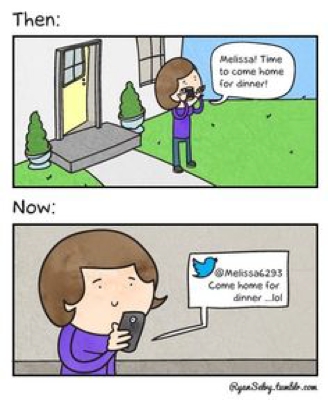Technology: Help Or Hinderance?
In today’s world, most people use some form of technology, especially smartphones. Although they can make life somewhat easier as far as communicating with others, they can also become very addictive.
A recent study conducted by Baylor University revealed some interesting facts about how people utilize their smartphones and how much time they spend on them daily.
The study found that women spend the most time on their phone, a total of 10 hours. Men aren’t too far behind though. They spend at least 8 hours on their phones.
Professor James Roberts of Baylor University interviewed 164 college students to see if they were addicted to their phones.
The results were astounding: 95 minutes a day are used for texting, 49 minutes are used for email, 39 minutes for browsing Facebook, 35 minutes surfing the web, 27 minutes for listening to music. Some students even said they might “possibly” be slightly addicted to their phones.
Rafael Lahiff, a student here at HCC, said, “You could contain the use of technology. Abstain from using it at certain times of the day. Like turning your cell phone off at dinner. Say to yourself I will not use my phone. It helps to be in contact with people, but it hurts because you lose human relationships, forgetting the process of how to do those things.”
HCC Counselor Linda Wolfson said, “We have technology, so I don’t think we can not have it. We certainly lived without it. We lived very effectively, some people would complain that too much technology while helping people connect like Facebook, actually stops a deeper connect. It becomes two dimensional.”
She continued, “Face to face contact hasn’t gone away. Going out, eating out, hanging with friends that’s all face to face contact. But once something has been introduced that’s modern such as cell phones, I don’t see anyone getting rid of them. If someone calls you or texts you you’re supposed to text back immediately. You can put controls around it around the use of phones, but you can’t take it away from people.”
A study recently done by Common Sense Media revealed that 38% of children under the age of 2 have used Ipads and smartphones. As recently as 2011 the numbers were vastly different. Only 10% used technology at that time.
Sarah Steinberg, 39, the mother of two, said, “When you are traveling, rules fall away, You have huge blocks of time with other people around whom you don’t want to disturb if they cry or fuss. Books only work for part of the time. And you have this tool to occupy them.”
Jennifer Lutris, a librarian here at HCC, said, “I am concerned about the effect of parents using cell phones might have on their growing children. As babies develop, they learn a lot about human interaction from facial expressions. If a baby is doing something that would normally elicit a smile or laugh from a parent, but instead the parent is looking at his or her cell phone and frowning, I believe this could lead to developmental delays or at least confusion on the part of the infant. I have not looked into that concept, but I feel it is something people need to think about.”
There are those people who don’t use technology. Hamish Lutris, a Professor of History at HCC, said, “I don’t see technology ever slowing down. I’m dissatisfied with technology. Technology bypasses a lot of a person’s learning skills. I don’t own a cellphone. Social interaction is all I do. I’ve never owned a cellphone until I came to HCC, that is. It’s a choice. If you don’t like those things, you don’t need to own them. The problem is we are all obsessed with convenience. Technology doesn’t let you do things well. ”
Of course, using technology is a choice for the individual. For those who feel they may be too caught up in the technology craze Lutris offered this advice, “Take a ballpeen hammer and smash it into pieces. I never have nor did I ever need a cellphone. If you do all your prep work, if you’re organized you don’t need it. Its all convenience. If you smashed your phone today your life wouldn’t be affected that much.”